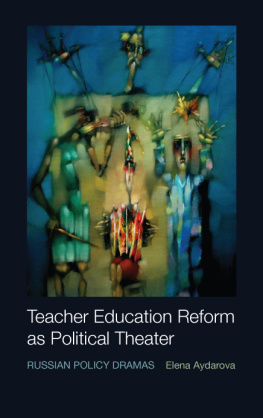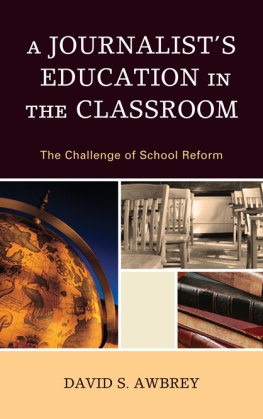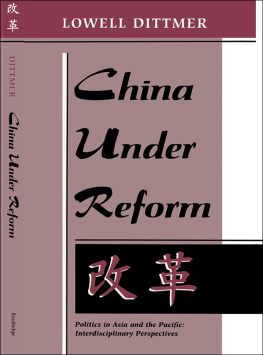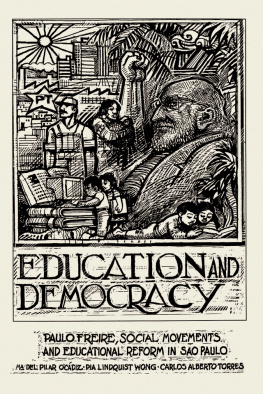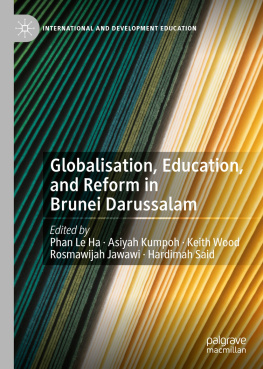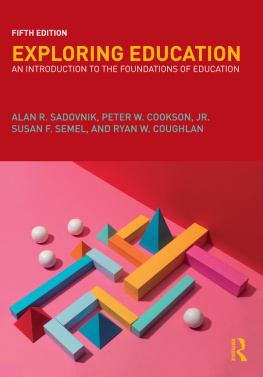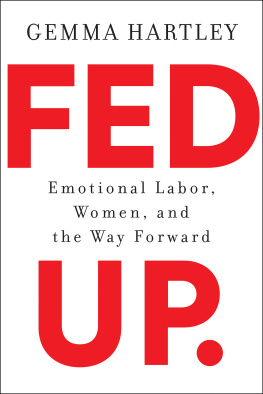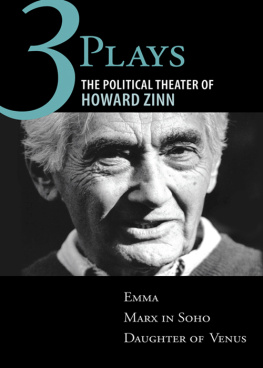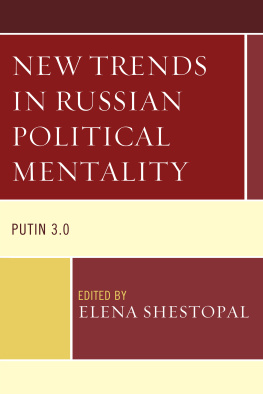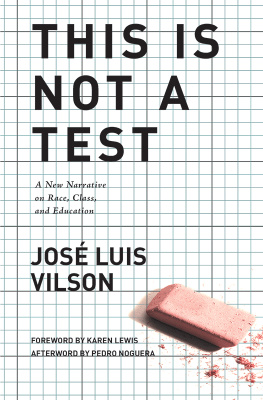Elena Aydarova - Teacher Education Reform As Political Theater
Here you can read online Elena Aydarova - Teacher Education Reform As Political Theater full text of the book (entire story) in english for free. Download pdf and epub, get meaning, cover and reviews about this ebook. year: 2019, publisher: State University of New York Press, genre: Politics. Description of the work, (preface) as well as reviews are available. Best literature library LitArk.com created for fans of good reading and offers a wide selection of genres:
Romance novel
Science fiction
Adventure
Detective
Science
History
Home and family
Prose
Art
Politics
Computer
Non-fiction
Religion
Business
Children
Humor
Choose a favorite category and find really read worthwhile books. Enjoy immersion in the world of imagination, feel the emotions of the characters or learn something new for yourself, make an fascinating discovery.
- Book:Teacher Education Reform As Political Theater
- Author:
- Publisher:State University of New York Press
- Genre:
- Year:2019
- Rating:3 / 5
- Favourites:Add to favourites
- Your mark:
- 60
- 1
- 2
- 3
- 4
- 5
Teacher Education Reform As Political Theater: summary, description and annotation
We offer to read an annotation, description, summary or preface (depends on what the author of the book "Teacher Education Reform As Political Theater" wrote himself). If you haven't found the necessary information about the book — write in the comments, we will try to find it.
Teacher Education Reform As Political Theater — read online for free the complete book (whole text) full work
Below is the text of the book, divided by pages. System saving the place of the last page read, allows you to conveniently read the book "Teacher Education Reform As Political Theater" online for free, without having to search again every time where you left off. Put a bookmark, and you can go to the page where you finished reading at any time.
Font size:
Interval:
Bookmark:

as Political Theater
Teacher Education Reform
as Political Theater
RUSSIAN POLICY DRAMAS
Elena Aydarova

Cover art: Valeriy Yaroslavtsev, Concert , 2008. Oil on canvas, 150 100cm. Reprinted with permission of the artist.
Published by State University of New York Press, Albany
2019 State University of New York
All rights reserved
Printed in the United States of America
No part of this book may be used or reproduced in any manner whatsoever without written permission. No part of this book may be stored in a retrieval system or transmitted in any form or by any means including electronic, electrostatic, magnetic tape, mechanical, photocopying, recording, or otherwise without the prior permission in writing of the publisher.
For information, contact State University of New York Press, Albany, NY
www.sunypress.edu
Library of Congress Cataloging-in-Publication Data
Names: Aydarova, Elena, 1982 author.
Title: Teacher education reform as political theater : Russian policy dramas / Elena Aydarova.
Description: Albany : State University of New York Press, Albany, [2019] | Includes bibliographical references and index.
Identifiers: LCCN 2018052655 | ISBN 9781438476155 (hardcover : alk. paper) | ISBN 9781438476162 (ebook)
Subjects: LCSH: TeachersTraining ofRussia (Federation) | Education and stateRussia (Federation) | Educational changeRussia (Federation)
Classification: LCC LB1725.R8 A93 2019 | DDC 371.102dc23
LC record available at https://lccn.loc.gov/2018052655
10 9 8 7 6 5 4 3 2 1
To Bevin and Zoya
Part I
Historical Context: Sowing the Seeds of Discontent
Part II
Directing Social Change: Russian Policy Dramas
Acknowledgments are like family albums. Allow me to share my family album with you.
First and foremost, I am endlessly grateful to every faculty member, student, administrator, policymaker, and educational researcher I met through my wanderings across the Russian Federation and the world. I cant name many of you, but you should know that without your tender care at times of confusion, rejection, suspicion, and doubt, I would never have come this far. If my project has not lived up to your expectations, please, forgive me.
No words can express my gratitude to many mentors who offered guidance during my work on this book. First, I am thankful to Lynn Paine, Michael Sedlak, Avner Segall, Alaina Lemon, and Chantal Tetreault for advice and generous readings of the earlier versions of this work. I owe an enormous intellectual debt to Suzanne Wilson, who first suggested that I look at teacher education reform as a form of theater. Without the support of David Post and David Berliner, this book would not have seen the light of the day. I am grateful to those who guided me through the earlier stages of this research projectKyle Greenwalt, Peter Youngs, Aaron Bodle, and Todd Drummond. I thank many others for powerful conversations that pushed my thinkingKathy Anderson-Levitt, Cynthia Dillard, Lesley Bartlett, Radhika Gorur, Iveta Silova, David Phillips, Francine Menashy, Kristine Phillips, Amy Stambach, Francine Vavrus, Nancy Kendall, Johnny Saldaa, Meg Gardinier, Eugene Matusov, Ana Marjanovic-Shane, and Tatyana Tsyrlina-Spady. Much helpful support came from mentoring opportunities created by the New Scholars Committee at the Comparative and International Education Society and the Council of Anthropology and Education of the American Anthropological Association.
I am thankful to Sheila Marquardt and Joshua Olmsted for opening their home to me when I needed to get away and write. I also owe huge thanks to Ricky Greenwell and Patrick Carriere at Minnesota State University for the crash course on theater they provided to a weary scholar in search of a better-fitting theoretical framework.
I would never have been able to go through all the research trips, analysis, and writing without the support of my spouse, Bevin Roue. Thank you for holding down the fort when I was roaming the earth and for taking so many burdens on yourself when I needed it most. I am also grateful to my family in Russia and Ukraine, who collected policy documents, forwarded newspaper articles, and debated politics with me throughout my research. Without my familys help, this project would never have come to fruition.
This project was made possible through a Fulbright Hays Doctoral Dissertation Research Abroad Fellowship and generous funding from Michigan State Universitys College of Education.
Some of the work for this book took place at the University of Illinois Summer Slavic Lab. I am thankful for the helpful guidance of librarians at the University of Illinois at Urbana-Champaign, particularly Joe Lenkart, who many times helped me fish out obscure but tremendously valuable Russian sources across many different libraries and hidden nooks of the internet.
Special words of gratitude go to my editor at State University of New York Press, Rebecca Colesworthy, for her support and guidance. I am also thankful to the anonymous reviewers of the manuscript, who provided generous and helpful suggestions for revision.
I take full responsibility for any errors that this text may contain.
On a sunny day in May of 2012, I made my way to one of the top teacher preparation institutions in RussiaOgnensk State Pedagogical University. Located in a historic downtown area, OSPU occupied a block of ornate buildings inherited from Russias imperial past. I was there for an education conference that brought together teacher educators, principals, teachers, and educational researchers from around the country. Marble statues, oil paintings, and red carpets adorning the interior of the main administration building where the conference took place impressed visitors with the institutions status as one of the oldest pedagogical universities in the country. Balloons hanging along the hallways created a festive atmosphere; professionally designed posters and banners informed participants about the main developments in Russian education. As I walked to the opening plenary, I watched men and women shaking hands, embracing, kissing each other on both cheeks, and laughing about how much they had changed since they last saw one another.
With velvet seats facing a stage draped in dark pleated curtains, the large plenary auditorium resembled a theater. Half of the seats were reserved for esteemed visitors: university rectors, school principals, members of the Scientific Council, and others. In the balconies above the auditorium sat students who appeared to be in awe of what they saw in front of them. Large TV screens displayed announcements, graduation pictures, and images of books published by OSPUs professors. Music from old Soviet school films played in the background. Forty-five minutes after the scheduled start, someone stood up, motioning others to follow suit in order to greet the governor.
The governors speech was short. He noted that it was important to carry out the tasks set by the countrys leaders. Even though education was a conservative field, it had to be reformed to initiate change in other sectors of the economy and society. With that, the governor called for implementation of Our New School, a policy issued in 2010, stating that it served as the starting point for the modernization of the nations education. The governor also congratulated the university on its two-hundred-year anniversary and praised it for supplying high-quality teachers for the citys schools, saying that half of the citys sixty thousand teachers were graduates of the university.
Font size:
Interval:
Bookmark:
Similar books «Teacher Education Reform As Political Theater»
Look at similar books to Teacher Education Reform As Political Theater. We have selected literature similar in name and meaning in the hope of providing readers with more options to find new, interesting, not yet read works.
Discussion, reviews of the book Teacher Education Reform As Political Theater and just readers' own opinions. Leave your comments, write what you think about the work, its meaning or the main characters. Specify what exactly you liked and what you didn't like, and why you think so.

